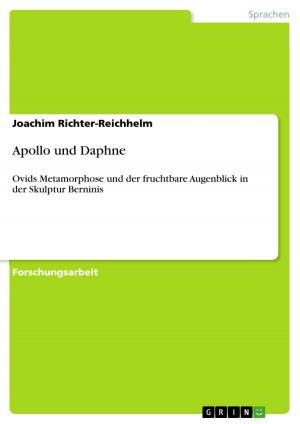The role of fortune in 'The Consolation of Philosophy' in comparison with 'The Knight's Tale' and 'The Tale of Melibee'
Fiction & Literature, Literary Theory & Criticism, British| Author: | Jacqueline Barth | ISBN: | 9783668288591 |
| Publisher: | GRIN Verlag | Publication: | August 31, 2016 |
| Imprint: | GRIN Verlag | Language: | English |
| Author: | Jacqueline Barth |
| ISBN: | 9783668288591 |
| Publisher: | GRIN Verlag |
| Publication: | August 31, 2016 |
| Imprint: | GRIN Verlag |
| Language: | English |
Seminar paper from the year 2014 in the subject English Language and Literature Studies - Literature, grade: 1,0, University of Dusseldorf 'Heinrich Heine' (Anglistik: Medieval Studies), course: Manifestations of Cultural Concepts in Medieval English Literature, language: English, abstract: This thesis will deal with the role of fortune in Boethius' 'Consolation of Philosophy' in comparison with two stories of Chaucer's 'Canterbury Tales', namely 'The Knight's Tale' and 'The Tale of Melibee'. 'The Consolation of Philosophy' was one of the most translated works in history and therefore it must have been of great significance. It was understood as the paragon of Christianity, although few voices did see the more philosophical elements as superficial. In the 15th century Chaucer's translation of this work was one of his most popular compositions. His point of view coincides in many aspects with Boethius as he was Christian too and Chaucer was considered a 'supremely philosophical poet' as in medieval times poetry was not distinguished from philosophy. Chaucer translated Boethius' main work 'The Consolation of Philosophy' which he wrote during his arrest in prison in 523/24. Hence it can be assumed that he knew a great deal about him and his work had a massive influence on his poetry namely the Canterbury Tales which he was writing at the time he was translating Boethius' 'Consolation of Philosophy'. In research the examination of the similarities between Boethius and Chaucer's works are quite popular as they all agree that Chaucer adapted many ideas from Boethius. Stretter for example examined in detail to what extend love corresponds with fortune in 'The Knight's Tale'. At first there will be a brief introduction to Boethius' 'Consolation of Philosophy', followed by a description of the characteristics of fortune. Then I will compare in what way these characteristics are mirrored in 'The Knight's Tale' and 'The Tale of Melibee'. Furthermore I will also investigate some other topics that necessarily emerge from fortune as this leads to the question what should be sought if not fortune, which results in the search for happiness and the right way to achieve it. This correlates with the control of the emotions which are the essential premise and the cause for all misdeeds. As men are deluded by their senses they are not able to think and act reasonably.
Seminar paper from the year 2014 in the subject English Language and Literature Studies - Literature, grade: 1,0, University of Dusseldorf 'Heinrich Heine' (Anglistik: Medieval Studies), course: Manifestations of Cultural Concepts in Medieval English Literature, language: English, abstract: This thesis will deal with the role of fortune in Boethius' 'Consolation of Philosophy' in comparison with two stories of Chaucer's 'Canterbury Tales', namely 'The Knight's Tale' and 'The Tale of Melibee'. 'The Consolation of Philosophy' was one of the most translated works in history and therefore it must have been of great significance. It was understood as the paragon of Christianity, although few voices did see the more philosophical elements as superficial. In the 15th century Chaucer's translation of this work was one of his most popular compositions. His point of view coincides in many aspects with Boethius as he was Christian too and Chaucer was considered a 'supremely philosophical poet' as in medieval times poetry was not distinguished from philosophy. Chaucer translated Boethius' main work 'The Consolation of Philosophy' which he wrote during his arrest in prison in 523/24. Hence it can be assumed that he knew a great deal about him and his work had a massive influence on his poetry namely the Canterbury Tales which he was writing at the time he was translating Boethius' 'Consolation of Philosophy'. In research the examination of the similarities between Boethius and Chaucer's works are quite popular as they all agree that Chaucer adapted many ideas from Boethius. Stretter for example examined in detail to what extend love corresponds with fortune in 'The Knight's Tale'. At first there will be a brief introduction to Boethius' 'Consolation of Philosophy', followed by a description of the characteristics of fortune. Then I will compare in what way these characteristics are mirrored in 'The Knight's Tale' and 'The Tale of Melibee'. Furthermore I will also investigate some other topics that necessarily emerge from fortune as this leads to the question what should be sought if not fortune, which results in the search for happiness and the right way to achieve it. This correlates with the control of the emotions which are the essential premise and the cause for all misdeeds. As men are deluded by their senses they are not able to think and act reasonably.















